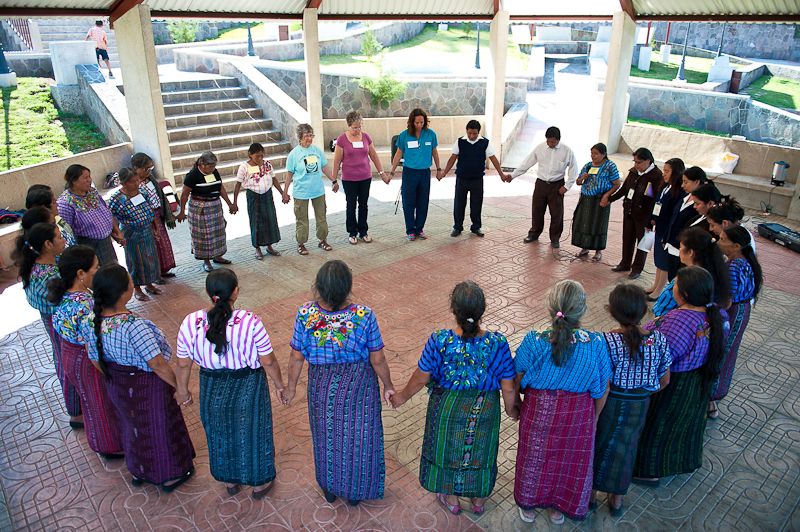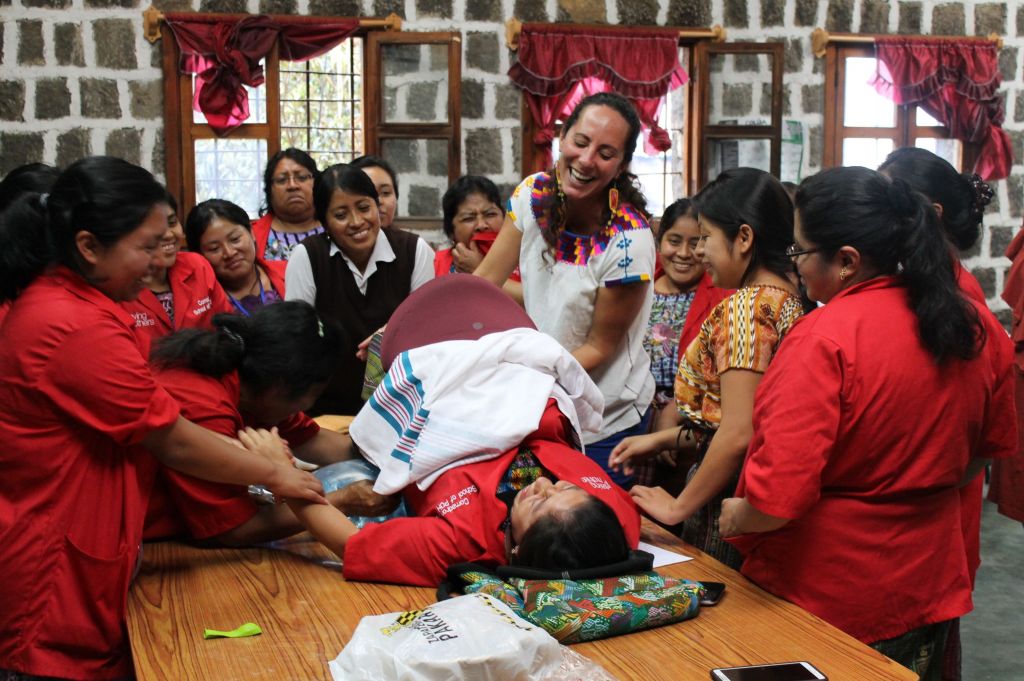Saving Mothers School of PowHer
Location: Guatemala
Background
In Guatemala the rate of maternal mortality continues to be unacceptably high. Mayan women living in rural areas are more adversely affected than their non-indigenous counterparts; the maternity mortality ratio for Mayan women (163 per100,000) is more than twice that of non-indigenous women (78 per 100,000). One of the largest factors contributing to these differences is the fact that up to 80% of Mayan women deliver at home without ever receiving prenatal care due to shockingly low access to essential obstetric care and the innate cultural practice of relying on a comadrona (traditional birth attendant) during pregnancy and delivery.
Guatemala comadrona culture is unique as it is founded on a belief that abilities are not taught, but are a direct gift from God revealed to them in a dream. These women are highly respected in the community and are constantly sought out by expectant women for spiritual guidance, abdominal massages, traditional hot steam baths, and assistance during labor. Most comadronas have no formal schooling or prior training in maternal health leading to major disparities between the skills of individual comadronas. These inconsistencies directly affect pregnant women, as untrained comadronas don’t know how to provide prenatal care, detect early complications, refer appropriately, or provide a clean and safe labor.
Despite these discrepancies comadronas hold a high-stake position in Mayan communities and if properly trained they can provide the much-needed link between Mayan women and the Guatemalan healthcare infrastructure.
Recognizing the importance of training comadronas to become experts in basic prenatal care and safe labor is the basis for the SAVING MOTHERS School of POWHER (Providing Outreach in Women’s Health and Educational Resources) training program. This program model trains comadronas while respecting local customs with an ultimate goal of a locally run school for comadronas run by comadronas. The program is based out of the rural community of Santiago Atitlán where 97 percent of the population is indigenous. The school runs for 14 weeks, has both a lecture and clinical component, incorporates all literacy levels, and teaches comadronas how to perform focused prenatal care, how to refer appropriately, tests their knowledge retention via three exams, and assesses their clinical skills in real time. Upon their graduation each graduate receives a prenatal kit that includes essential supplies, such as a blood pressure cuff, stethoscope, tape measure, and fetal Doppler, needed to provide basic prenatal care. Since 2014 there have been three classes of the School of POWHER with 48 graduates. The training program is significantly increasing access to prenatal care and safer births in the Atitlán region; in 2016, School of POWHER comadronas performed 360 prenatal visits and identified 15 women at risk of complicated labor, who were referred to appropriate higher-level care.
Principle Objective of the Project
Despite this success there is still important work to be done, and the School of POWHER, with the support of their sister chapter Salvando Madres, is currently in a position to help further integrate and legitimize these indigenous health providers within the Guatemalan healthcare system. The last three classes of the School of POWHER, executed by the Guatemala Programs Director, not only trained the graduates in prenatal care but helped to shape these graduates into educators as well as strengthen the relationships between them and the medical community in Santiago Atitlán. These comadrona-educators are now able to independently lead the upcoming School of POWHER.
Saving Mothers is committed tohaving a school for comadronas run by comadronas. Two head comadronas, graduates from the original class, have been identified as lead educators that will deliver the lecture portion of the school in Mayan dialect, helping to decrease the linguistic barrier encountered in the past.
Six additional graduates have been identified as clinical preceptors that will teach and oversee prenatal home visits for the 20 new student-comadronas during the clinical portion of the curriculum. These eight comadrona-educators will continue clinical training in basic prenatal care for eight months following the fourth school of POWHERs graduation, which will help reduce gaps of clinical abilities previously faced.
The School of POWHER comadrona-educators will be working closely with the Sololá Area de Salud staff (the local branch of the Guatemala Ministry of Health) as they are allowing the new comadrona-students to complete part of their clinical practices at the local government health posts. These working relationships between Ministry of Health staff and School of POWHER comadronas are key, as they will aid in reiterating the pivotal role comadronas hold in the Guatemalan healthcare system as both educators and birth attendants.
To date, all School of POWHER graduates have been assessed in their clinical knowledge on prenatal care, basic obstetric practice, and emergency management. Although graduated comadronas have strengthened their knowledge in areas of newborn assessment/care, labor & delivery, and family planning, the retention of their clinical skills have not been systematically measured. Therefore, the second addition to the School of POWHER will be an addition of a real-time clinical skills assessment to the curriculum. The components of this checklist incorporate current WHO healthcare practices and have been approved by the Ministry of Health in Guatemala. The prenatal skills checklist will be administered at the beginning of the school, midway through, and at graduation in order to have a thorough assessment of skill improvement.
This clinical data will directly measure the clinical improvement of each comadrona as a direct result of their participation in the School of POWHER. The prenatal skills checklist will also be heavily incorporated in follow-up education post graduation. Each comadrona graduate will be evaluated on home visits with the prenatal skills checklist every month for a total of eight months following graduation in order to keep the graduate’s clinical skills up to date and to ensure that optimal medical care is being provided. In addition, during these monthly visits with each comadrona, patient prenatal data and number and reason of referrals will be collected and reported to the local Ministry of Health staff. The clinical skills checklist not only provides a way to measure direct clinical skill development pre and post the School of POWHER but also provides an easy and accessible tool for the clinical preceptors to use as they continue to teach and support our students during and after the school.
With the incorporation and implementation of a clinical skills checklist, it will be possible to measure how well past and future School of POWHER graduates are performing in complete basic prenatal care during their routine home visits. Demonstrating to the local Ministry of Health that graduates of the School of POWHER can effectively provide culturally appropriate basic prenatal care, and adhere to their guidelines, will further legitimize their role as actual healthcare providers.
SAVING MOTHERS has screened and selected all of the comadrona-educators. The two head comadrona-educators have been working with Saving Mothers, since 2014 and since then have continued their maternal health education training with the organization. During the third School of POWHER, which ran from August to November of 2016, these two head comadronas assisted in delivering the didactic portion of the curriculum giving them first hand experience with the curriculum. With their continued training, past experience, and deep ties to the community these two comadronas are the ideal candidates as lead educators for the fourth School of POWHER that began March 14th, 2017. The six comadronas chosen as the clinical preceptors for the clinical component of the curriculum have already been selected based on multiple factors which include the following: continued involvement with the organization and scores within the 90th percentile on their knowledge and clinical exams. Currently, these six comadronas are reviewing the clinical curriculum of the School of POWHER and in the next two months will be going on a minimum of ten supervised visits to ensure that every preceptor is delivering prenatal care in a systematic manner before the start of the clinical portion of the fourth school of POWHER.
Additionally, in the fall of 2016 the prenatal skills checklist was developed from the clinical curriculum, WHO guidelines, validated training manuals for birth attendants, and in December of 2016 the local branch of the Ministry of Health approved its contents. From January to March of 2017 there was a small pilot launch of the prenatal skills checklist to ensure that its contents were culturally appropriate in practice. The checklist was tested on School of POWHER graduates and out of the 48 graduates we were able to recruit 12 comadronas to participate.
Three Saving Mothers volunteers, who are senior medical students, were on ground to evaluate the 12 comadronas on prenatal visits. The graduating classes of Santiago Atitlán and San Juan La Laguna have been observed on a total of 45 prenatal home visits. Of those 45 visits, 34 were initial visits and 11 were revisits. A total of 18 women were referred (3 for a previous complicated pregnancy, 2 for fetal malposition, and 13 for reporting one of the signs or symptoms of warning); one of these referrals revealed fetal demise. Overall skill strengths were found in correctly taking basic vitals (correct BP and HR in 30/45 visits) and counseling (37/45 women were counseled on signs and symptoms of pregnancy, importance of prenatal vitamins and Td vaccine). Skill weaknesses were evident in lack of hand washing (during 20/45 visits no hand washing occurred) and lack of a discussion of an emergency birth plan (13/45 women were not asked about their plan of emergency during labor). In 40% of the homes, there is no running water and it is apparent that using Purell, which Saving Mothersprovides, is something that is not culturally ingrained. The local staff will be focusing on this during follow up education. Due to the success of this pilot phase, the clinical skills checklist will be integrated into the current School of POWHER curriculum as previously explained.
Evaluation and Sustainability
The School of POWHER graduates will be evaluated in the following ways: knowledge assessments during the school before and after each module, prenatal clinical skill assessments during and post graduation, and recorded prenatal visits and referrals during and post graduation.
Since this will be the first year that Mayan comadronas will be leading the school this test data will also be compared to the same data from the previous three schools which was led by an international volunteer.
The School of POWHER, run once a year and followed by eight months of clinical practice, is a sustainable model as it integrates the Mayan cultural practice into optimal prenatal care creating a new combined healthcare model supported by the Ministry of Health. Furthermore, this new model of the School of POWHER ensures that comadronas, the women at the very core of this unique Mayan culture, are validated educators and leaders in the community they serve. Each comadrona has around a 25-year career, which suggests that these comadronas can change the lives of 50,000 Guatemalan women over the next 25 years.






